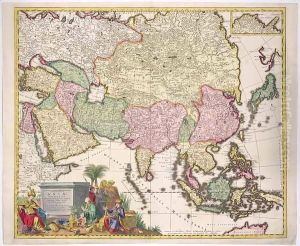Karel Allard Paintings
Karel Allard was a prominent Dutch cartographer, engraver, and publisher, born in 1648 in Amsterdam, Netherlands. He stemmed from the Allard family, a well-known dynasty of engravers and publishers who played a significant role in the Dutch Golden Age of cartography. The period was characterized by unprecedented advancements in map-making techniques, exploration, and a burgeoning interest in the world beyond Europe, all of which provided a fertile ground for Allard's career.
Karel took over the family business from his father, Hugo Allard, who had established a reputable publishing house in Amsterdam. Under Karel's leadership, the Allard firm flourished, becoming one of the foremost publishers of maps, atlases, and globes in the late 17th and early 18th centuries. He was known for his meticulous attention to detail and his ability to incorporate the latest geographical discoveries into his works. Allard's maps were not only functional but also highly decorative, featuring elaborate cartouches, sea monsters, ships, and compass roses, making them prized possessions among collectors and scholars alike.
Throughout his career, Allard collaborated with many of the period's leading scientists and explorers, ensuring that his publications reflected the most accurate knowledge of the time. He was instrumental in disseminating the works of explorers, thereby contributing to the expansion of European knowledge about the world. His maps and atlases covered all parts of the known world, from the Americas to Asia, and were crucial in the navigation and exploration activities of the era.
Karel Allard's contributions extended beyond cartography. He was also involved in the production of art prints and books, further showcasing his versatility and influence in the world of Dutch publishing. Despite the competitive nature of the industry, Allard's firm remained at the forefront, testament to his skill, innovation, and the high quality of his products.
Karel Allard passed away in 1709, leaving behind a legacy that would influence future generations of cartographers and engravers. His work remains highly valued by historians, collectors, and scholars for its artistic merit and historical significance, offering insight into the geographical understanding and aesthetic sensibilities of his time. Through his contributions, Allard played a crucial role in the development of cartography, making him a key figure in the history of map-making.
